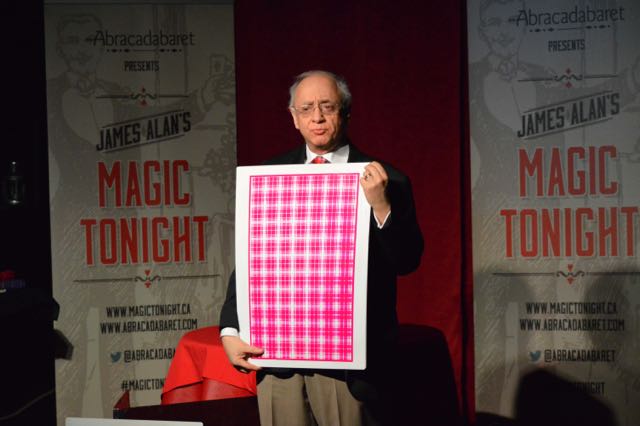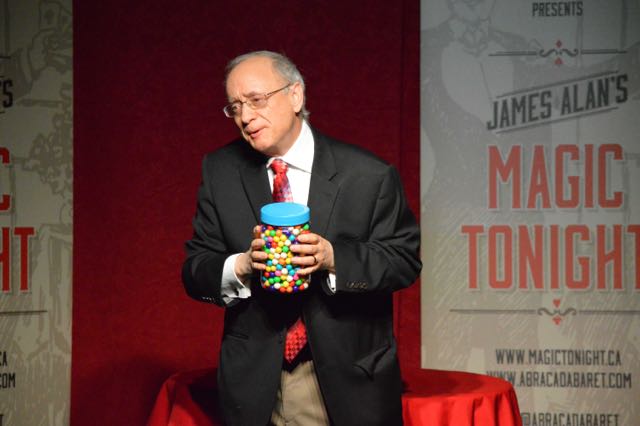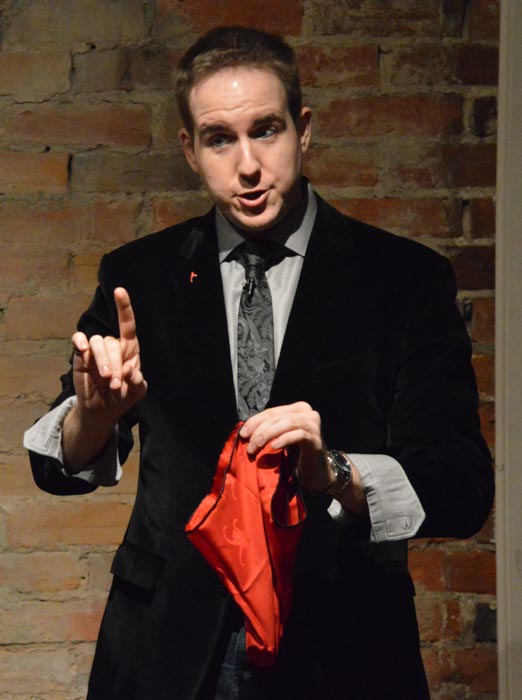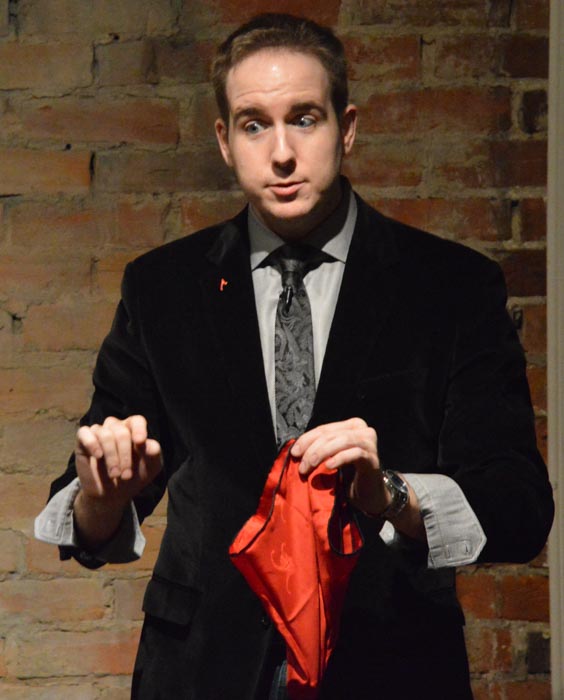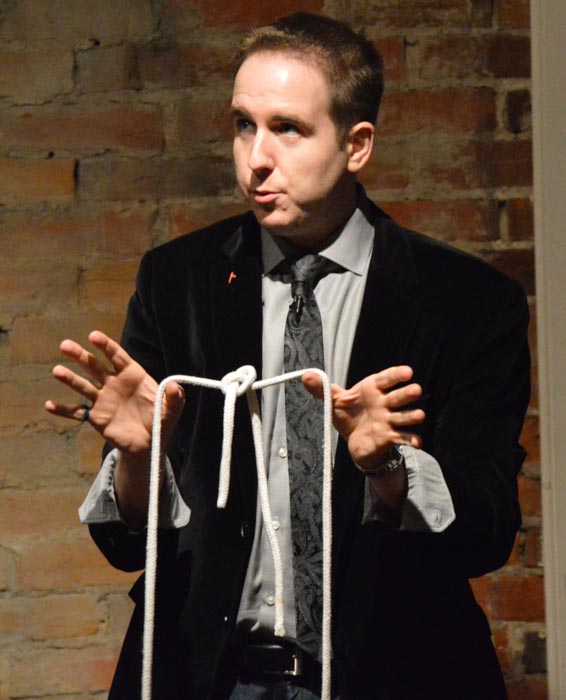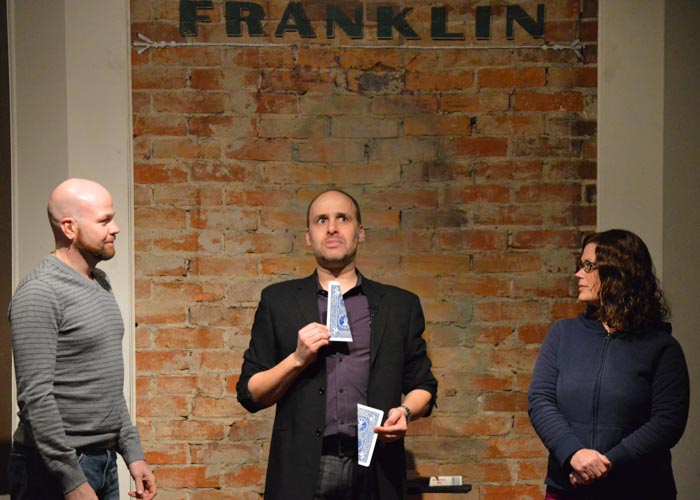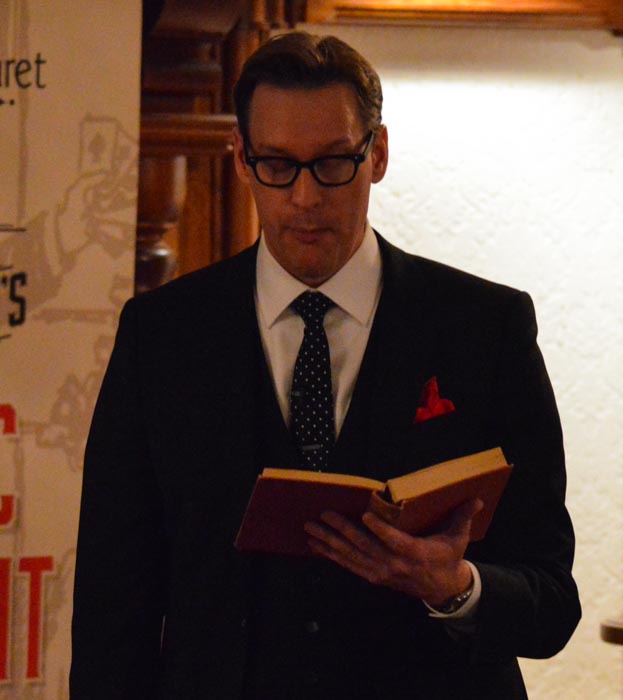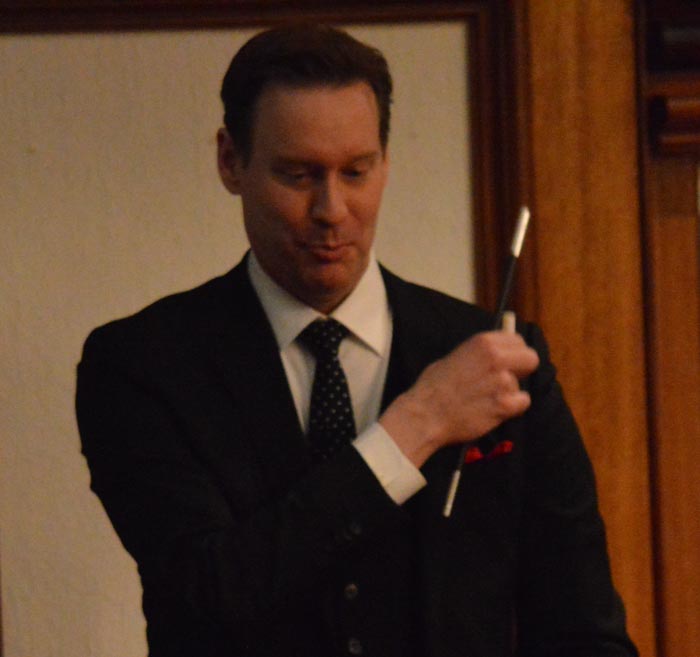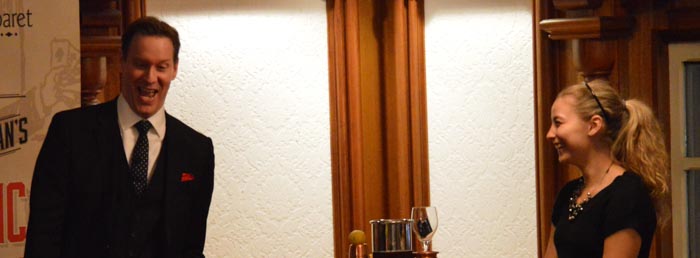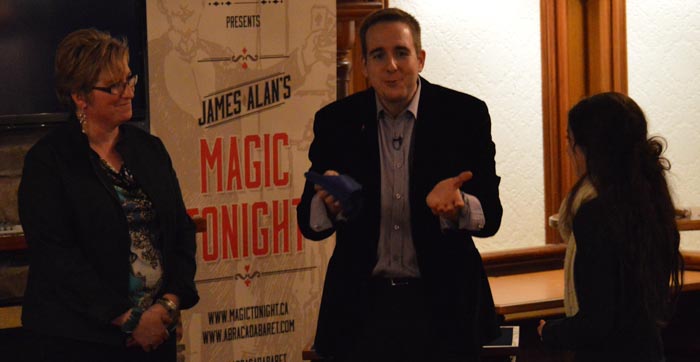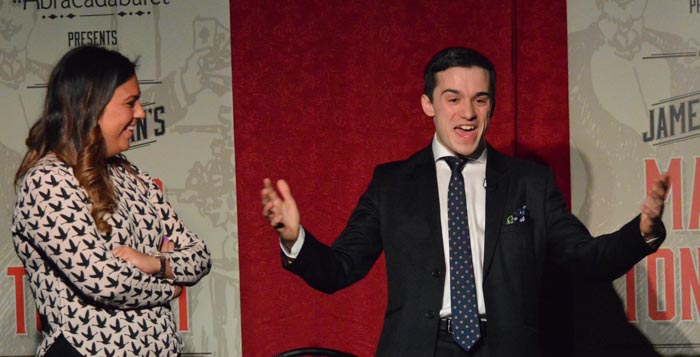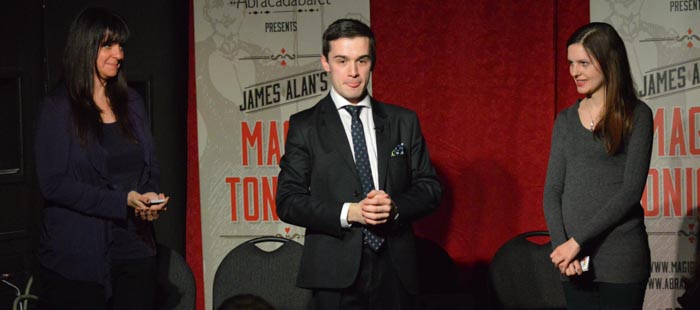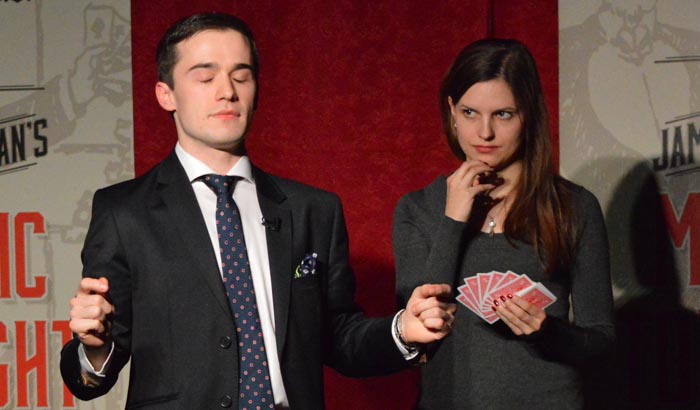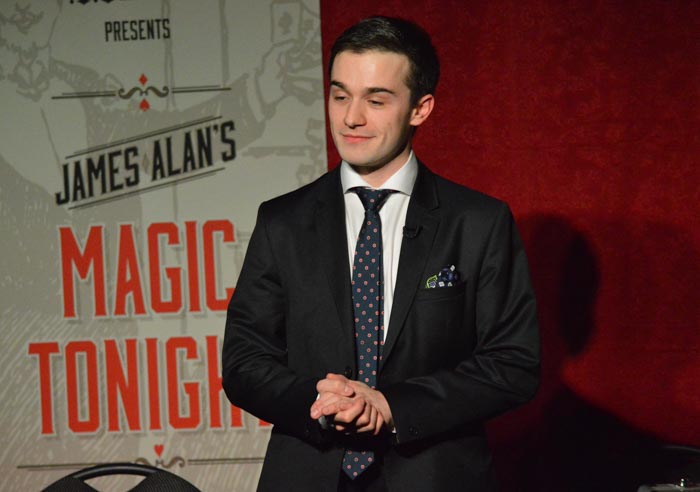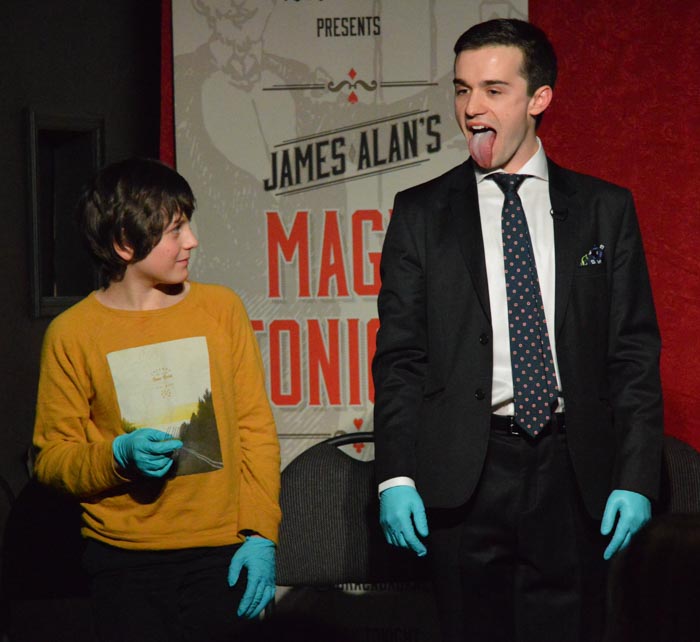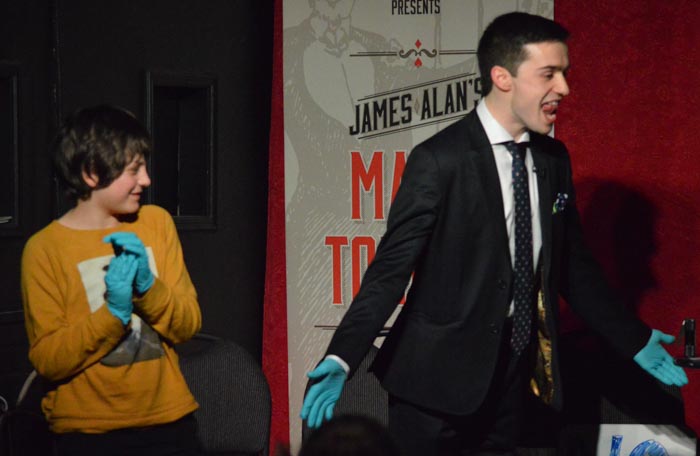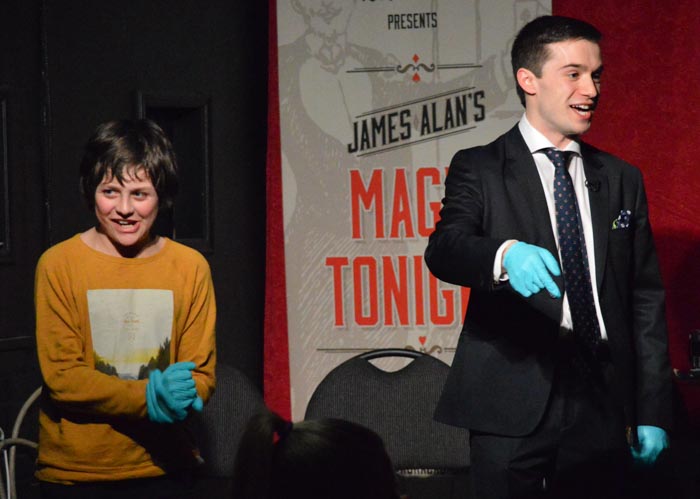Coming up on Sunday we have a very special guests joining us. Recently returning from a whirlwind tour of Fringe Festivals which took him through London, Montreal, Orlando, Winnipeg & Edmonton, the irritatingly photogenic Keith Brown will be presenting highlights from his acclaimed one-person show Exchange. If you'd like to come see the show, readers of this blog can use the code reality for a discount on the price if tickets and dinner when purchasing online.
Face 2 Face
Last year at Magic Tonight, we hosted a special fundraiser dinner for the Centre for Inquiry Canada. Following the show, in an effort to add some educational content to our programming, we did an extended interview and Q&A with Michael Close and the host of Face2Face, David Peck. We were allegedly discussing "Wonder in the 21st Century" or "The Role of Magic in a Modern Secular Society", but it was in front of a live audience with Q&A and tangents galore, discussing the history of magic, the theory behind why magic works and a few other things. The audio from that interview is now available online for the world to listen to. Stream or download over at DavidPeckLive.com, or look for Face2Face on Rabble and iTunes.
Magic Tonight has weekly performances in Toronto, Mississauga and Pickering with a variety of special guests. Readers of this blog can use the code reality when buying tickets online for a special discount on the price of tickets and dinner.

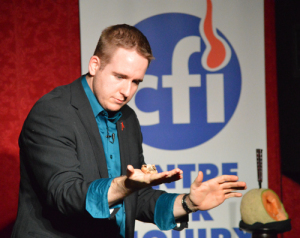
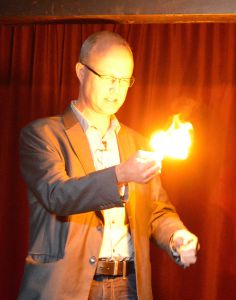
A week of Funny Faces
Any time we have a show, we try to preserve the memories with photos — smiles, shock, astonishment, bewilderment, wonder. The gallery over at Abracadabaret.com has a substantial collection. I've shot some myself. Other times I hand off the camera to see what someone else captures. Sometimes the photos are gorgeous, and other times the lighting is substandard, or the background is just strange. But through these photos — sorting them, cropping them, shooting them myself — has taught me a great deal about the performance of magic. Magic is an extremely difficult thing to photograph. Magic isn't static; it's based almost entirely on transformation and change. If a woman vanishes and I take a photo, a woman not in a photograph is not particularly impressive. It's the change from woman standing there to woman not standing there that makes for magic. Even mind reading, which some now consider to be magic in its purest form, is categorically unphotogenic. If I take your secret thoughts and speak them out loud, the resulting picture of our faces might be indistinguishable from the photo we'd get if I had just told you an exceptional "Knock-knock" joke.
And as I'm fond of telling young magicians, if you make cards magically spew from your mouth (a cool trick if ever there were one) don't take a picture of it. To the outside world, it simply looks like you are chewing on a fan of cards.
Most of the people who appear on the show are "talking acts". That means that a large portion of the photos taken will capture the face in the middle of a word. Not the most flattering position. This week, I was sorting through photos and the strange and funny faces seemed to jump out at me. So here, without anyone's consent, is a collection of The Funny Faces of Magic Tonight.
Thanks to Ron Guttman, Jason Palter, Brian Roberts and the irritatingly photogenic Keith Brown for not punching me.
Magic Tonight happens every week in Mississauga, Pickering and Toronto. Readers of this blog can use the code reality for a special discount when buying tickets online.
Winning Strategies for Rock-Paper-Scissors
One of my more useless talents is that I'm particularly good at Rock-Paper-Scissors. As a youngster I was put into a skiing school in the mountains of British Columbia and for a week, we spent most of our time on the chairlift playing the game. (We also invented several useless and mathematically inconsistent plays including but not limited to dynamite, water-well and possum... I know, I could have been put in a box and studied.)
It's nice to see some of the strategies I came up with reproduced by the scientific community.
This is fairly similar, but not identical to the way I play (I need to keep my actual system sub rosa in case I'm ever called on to defend my title as Almighty-supreme-Rock-Paper-Scissors champion on Madison avenue.)
There's a second, amusing follow up video here.
Deception on The Infinite Monkey Cage
There is a delightful BBC Radio Podcast called The Infinite Monkey Cage, with theme song by Eric Idle and hosted by Robert Ince and Brian Cox (the guy Stephen Hawking pushed into the river on the Monty Python reunion show.)

This is the episode from January 19, 2015, entitled Deception. It's available on iTunes or from the BBC.
No one does the panel discussion as well as the Brits and it's a very interesting discussion. And includes a magician and respected academic, Richard Wiseman.
One of the most intriguing things they mention, which I don't hear discussed very often, is that we are not very good at knowing when we are being deceived. There is a natural tendency to both accept things at face value, and to assume others will accept things at face value.
It also turns out that many of the "tricks" you are supposed to be able to use to detect deceptions (facial ticks and other visual cues) don't really work.
I guest listener be warned.
Strange Wagers
In a recent Veritasium video, Derek Muller can be seen accosting Australians in the street and giving away money (almost) and they turn him down. The video itself is really interesting and you should watch it and see if you feel the same was as the people he's talking to.
The strange feature this highlights is that the human mind is woefully inadequate when it comes to assessing probability and risk. Even though the arithmetic for assessing whether or not his bet is straightforward enough to be carried by an elementary school students who has a decent handle on fractions, there are instincts at work behind your eyes consistently pushing you away from the right answer.
One of the most interesting secrets in magic involves exploiting people's inability to accurately assess risk. Risk is not linearly additive (when you put two risks together, you don't wind up with one single risk which is twice as big) so it runs afoul of our mental bookkeeping.
There are a surprising number of tricks which either derive their method (or at least their drama and impressiveness) from disguising risk. Most magic tricks require a chain of events to unfold in exactly the right way in order to work. One weak link - one mistake - and the whole thing allegedly falls apart. It turns out not to be as true you would at first believe. When you see a trick where there are lots of choices — he could have opened the book to a different page, he could have thought of a different number, he could have chosen a different key to the locked box —that means there are lots of chances for things to go wrong. In reality what that usually means is that most of those choices don't matter; they don't affect the outcome of the trick in any meaningful way. On top of that, a little bit of acting can make just about any risk seem slightly larger than it actually is
There was a great Canadian sleight of hand performer, Martin Nash, who famously said:
If you want to perform miracles, you have to be willing to take risks.
The British impossibilist David Berglas said something similar but he's not Canadian, so there.
Unfortunately, they only way around this cognitive shortcoming seems to be formal training. You need to sit down with a teacher or a textbook and have someone walk you through the math step by step (this could be something like a statistics or a finance course). Then the most important part is to put the instinct on hold and to thoughtfully work through the math so you don't accidentally deceive yourself.*
*Unless you're in the audience at a magic show, then by all means let your intuition run wild. That's what we're here for.




